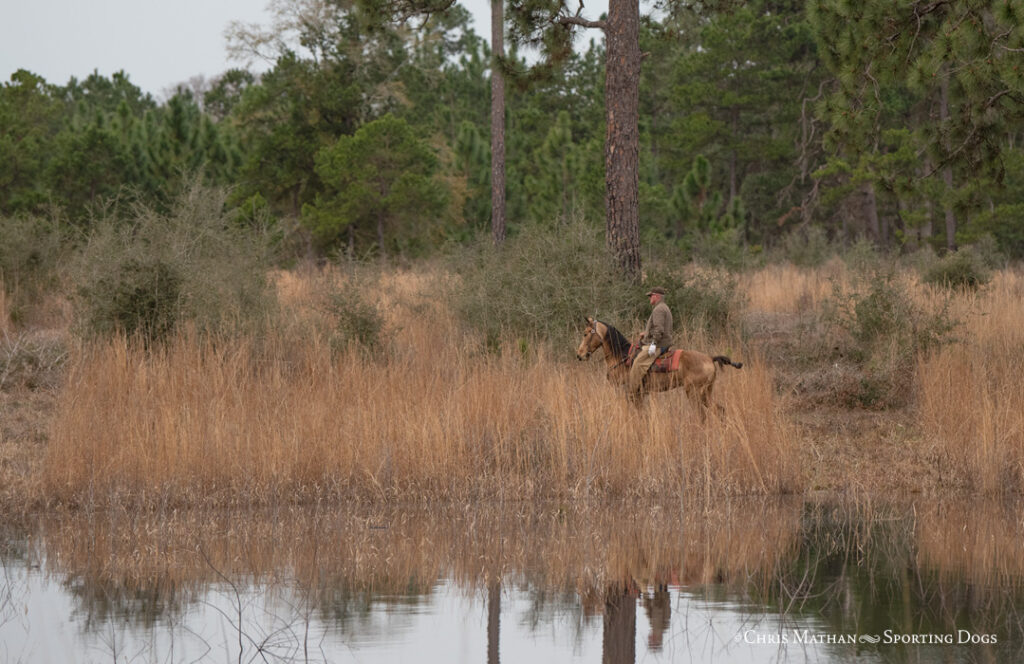“Ed Tate is going to have to retire,” Sam Nixon M. D. told Ben Reach at breakfast at Millie’s Diner.
“Why?” Ben asked.
“Heart disease, plus emphysema. Lifelong smoker,” Sam said.
“How old is Ed?” Ben asked.
“Sixty-seven,” Sam said.
“Shame. Ed’s a good man. Hell of a bird dog man,” Ben said.
Ben had known Ed, like almost all of the bird dog men in the country — not just those in Southwest Georgia — for decades. Ed had been one of a handful of for-the-public pointing dog trainer-handlers who traveled the circuit of all-age field trials held at the same times and places each year across the continent. Ed had won his share, trained and handled some noted dogs, multi-champions, over the years. He had his share of fame, among the small big-going-bird-dog-appreciating community, but to the rest of the wide world was just a tradesman, and a modestly paid one. Such was the bird dog world.
Next day, Ben got a call from Allen Ames, another member of the bird dog training-handling community. Allen was the twenty-five-year-old son of Roger Ames, manager of Leaning Pine Plantation, one of Thomas County’s iconic quail plantations, assembled in 1880 by a Robber Baron of that age from Cleveland as his icy-weather sporting getaway, since then handed down through inheritance until now owned by a great grandson of the assembler, he also a man smart with money and a lover of quail and the quail plantation culture.
Allen asked if he might meet with Ben for his advice, and of course Ben said sure and they agreed it would be at Ben’s office at four that day. Ben didn’t ask what Allen wanted his advice on, but he suspected he knew, and he was right.
For the last three years, Allen had been traveling the field trial circuit with Ed Tate as his scout and apprentice. He had done it against the strong objections of his father.
Roger Ames had told his son, “Field trials are a dead end. You cannot make a reliable living on them as a for-the-public handler. If you want a life around bird dogs work for a plantation owner like I have. Do your job right, you can have security and a reasonable income.”
Through his high school years Allen had worked par-time on Leaning Pine, where he had lived all his life with his parents until finishing high school and a year of Community College. His mother had managed the Big House there while his father had managed the plantation, its agricultural and hunting and timber activities, all centered on maximizing the quail but also minimizing losses through efficient irrigated crop land and pecan groves. Allen had helped with hunts, for dove and duck and turkey and quail. Occasionally for deer.
Allen had not liked how his parents seemed beholden to the plantation’s owning family, who were ultra-wealthy, as were their guests. He had vowed he would not live in an employer’s house, drive his truck or saddle his horse for him, as his father had, saying, “Yes Sir, Mr. Fred,” constantly, it seemed to Allen.
Allen had loved his time as Ed’s apprentice, the summer dog training in North Dakota July through August, the prairie trials in September, the pheasant trials in October, then the Deep South trials through late fall and winter, climaxing at the National Championship in Tennessee in February, finishing with the end-of-season Southeastern and Masters Championships at Albany in March, just concluded. Then Ed had told him of Dr. Sam’s finding he must retire.
As Ben had suspected, Allen wanted his advice on how he might buy Ed out and succeed him on the circuit, go on with his string of dogs.
“What have you got in savings?” was Ben’s first question.
“Twenty thousand dollars, from summer jobs, gifts from an uncle and an aunt toward college money,” Allen said.
“First question, will Ed’s owners keep their dogs with you?” Ben asked.
“Won’t know ‘til they are asked. Key will be, will the two that own Mr. Ed’s two best come with me.”
Ben had known that before Allen said it. Every handler depended on two dogs in his string at a time to keep him in the game. It was a rule of thumb old as the game. Andy Daugherty had first explained it to Ben more years ago than he could remember.
“Have you talked with Ed about it yet,” Ben asked.
“No, Sir. I wanted your advice first.”
“What has Ed got in the way of coming derbies?” Ben asked.
“So far, two that might make it. You never know this early,” Allen said.
At least he’s realistic about that, Ben thought.
Ben had watched Ed’s and Allen’s progress (and at times lack of it) on the circuit during their three years together, talked to others about it. Overall their record had been about a B, he calculated. If Allen could figure a way to buy Ed’s truck and trailer and four horses, and if Ed’s two best owners would leave their dogs with him, their was a slim chance Allen could pull off his dream. One other thing would be key: would Ed be willing to let Allen live with him on his small farm in Thomas County and keep his stock and dogs there when he was not away on the circuit, for free or at nominal rent? Ed was a widower. Ben’s bet was Ed would welcome Allen’s company, but he didn’t know.
To be continued in Part Two…
